- Blog
- How to Import a Car to Spain
How to Import a Car to Spain
Learn how to import cars from the EU to Spain as a dealer. Regulations, taxes, paperwork, and process covered in this step-by-step guide.

As a car trader, expanding your business across borders can open up new opportunities. If you're looking to import vehicles from other European Union countries into Spain, it's crucial to understand the process thoroughly.
While navigating the regulations may seem complicated at first, this guide breaks it down step-by-step.
We'll cover all the key requirements for legally bringing cars into Spain for commercial purposes from EU nations. With the right knowledge, you can streamline the importation process and avoid potential hiccups.
Get to know the Spanish used car market
The used car market in Spain boomed in 2022, with nearly two used cars purchased for every new car sold. This ratio peaked in 2021 due to the semiconductor shortage and is expected to remain high through 2025.
Inflation deeply impacted consumer behavior, with 85% of respondents citing new car price increases as a reason for buying used.
While used car sales to private individuals dropped between 2021 and 2022, companies and leasing businesses expanded their used vehicle fleets significantly.
However, second-hand vehicle imports increased by 20%, and the Spanish used car market currently estimated at USD 45.40 billion, and expected to reach USD 64.42 billion by 2029.
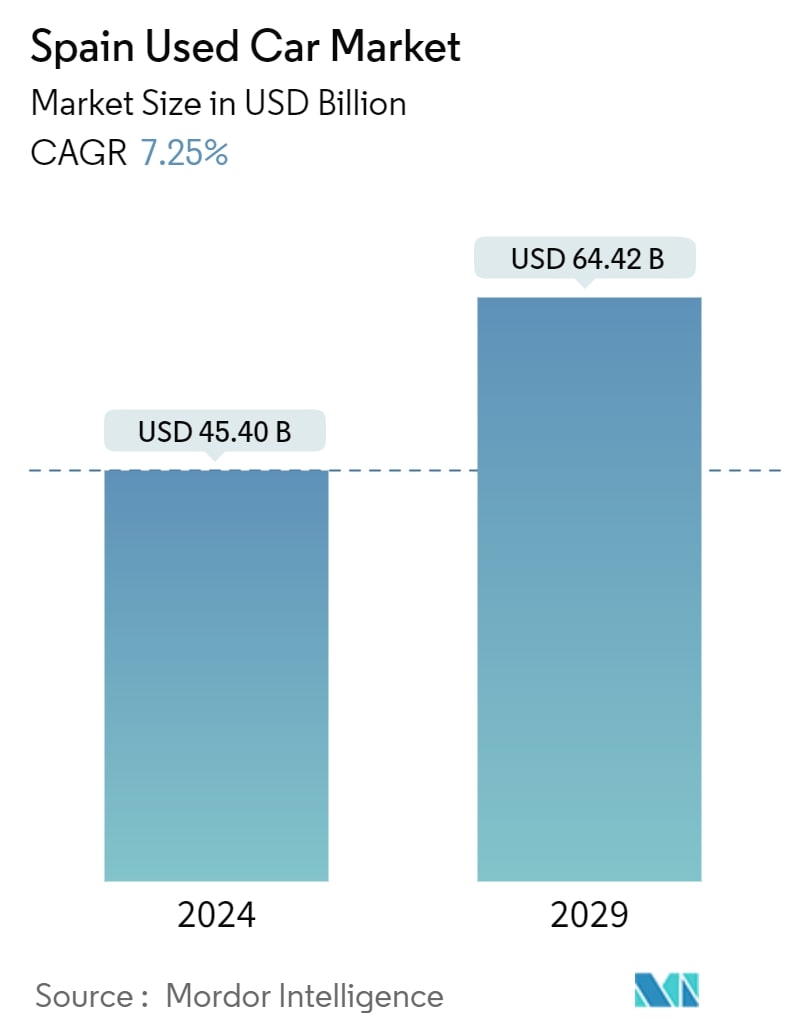
Source: Mordor Intelligence
Competition among dealers is also intensifying. Offering a diverse, high-quality inventory is crucial to standing out. Participating in auctions of ex-lease vehicles from Germany, France, Belgium, or The Netherlands allows you to broaden your selection and meet local demands more effectively.
Spain's import regulations
When importing cars into Spain for commercial purposes, there are specific regulations you need to be aware of. Spain has agreements with other EU countries that allow the free movement of goods, including vehicles. However, you still need to follow certain procedures and obtain the required documentation.
eCarsTrade Pro Tip: In Spain, specialized import agencies (brokers) can help with the entire bureaucratic process of importing a used vehicle from another country.
Simply google “Importación de vehículos a España Gestorías”, and you should have plenty of results to choose from.
Documentation required for car import to Spain
Having all the necessary paperwork ready is critical for a smooth car importation process into Spain. Here are the key documents you'll need to have prepared:
-
Proof of purchase (sales invoice)
This invoice proves you lawfully acquired the vehicle you wish to import. It shows the purchase transaction details and establishes your legal ownership, giving you the right to bring the car into Spain.
You will receive the invoice via email, but you can also find all your invoices on your Personal Page.
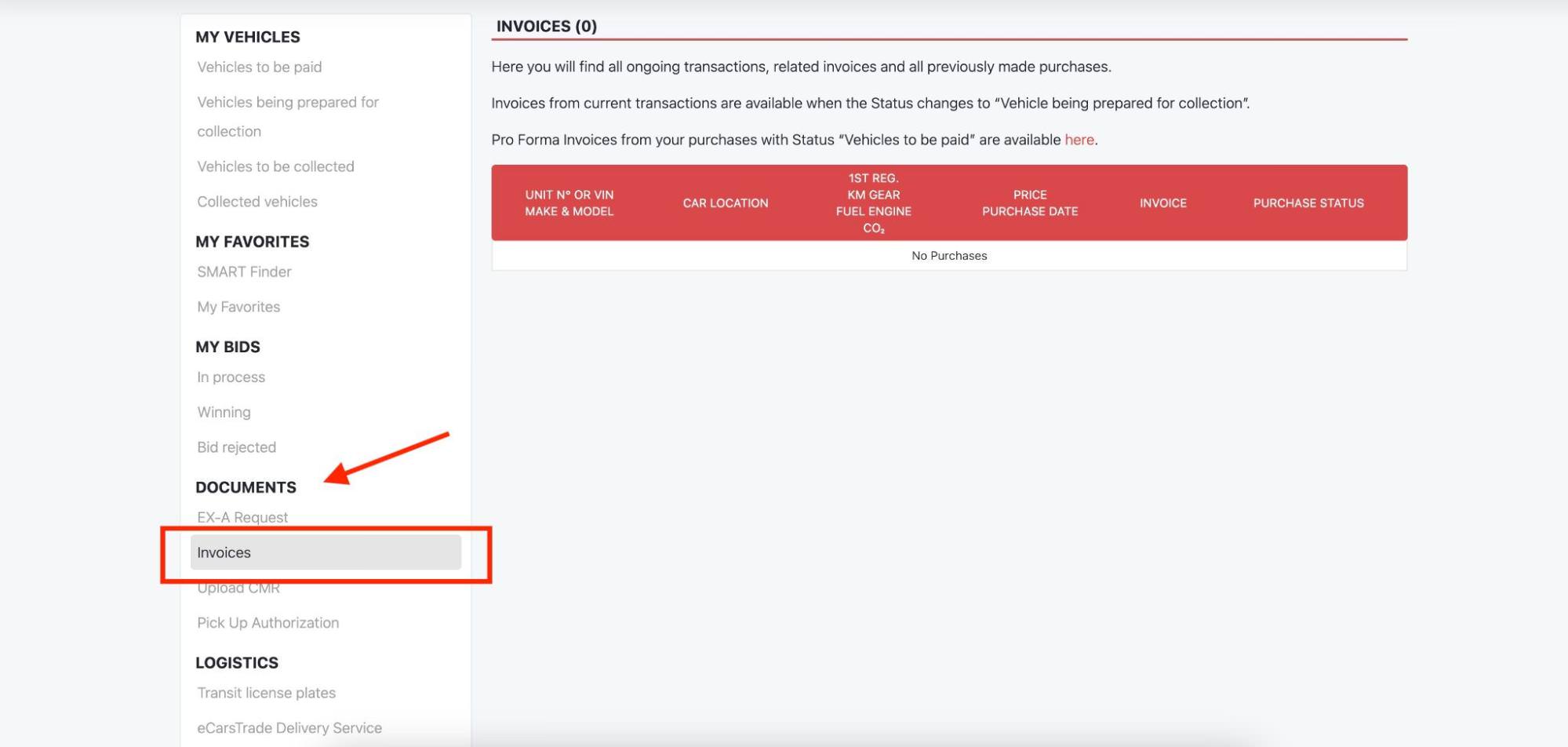
-
Car registration documents
At eCarsTrade, we ensure that each vehicle we sell comes with its authentic registration paperwork.
We offer two convenient options for providing you with the original documentation. You can either collect the documents when you pick up your car, or we can mail them to the address of your choice.
-
Certificate of Conformity (COC)
A COC is issued directly by the vehicle's manufacturer. This document certifies that the car meets all current safety, environmental, and technical regulations set by the European Union. Don't import without this proof of conformity.
If you've purchased a car from eCarsTrade and it didn't come with a Certificate of Conformity (COC), don't worry.
The availability of COCs varies depending on the vehicle's country of origin. While most of our vehicles sourced from Belgium and Luxembourg come with a COC, those from The Netherlands and Germany often have a COC that differs from the original manufacturer's certificate. Cars from France very rarely come with a COC.
If your newly acquired vehicle doesn’t have a COC, you have a couple of options to explore:
- Reach out directly to the car's manufacturer. They may be able to provide you with a COC, either free or for a certain fee.
- Alternatively, you can try online resources like EuroCOC
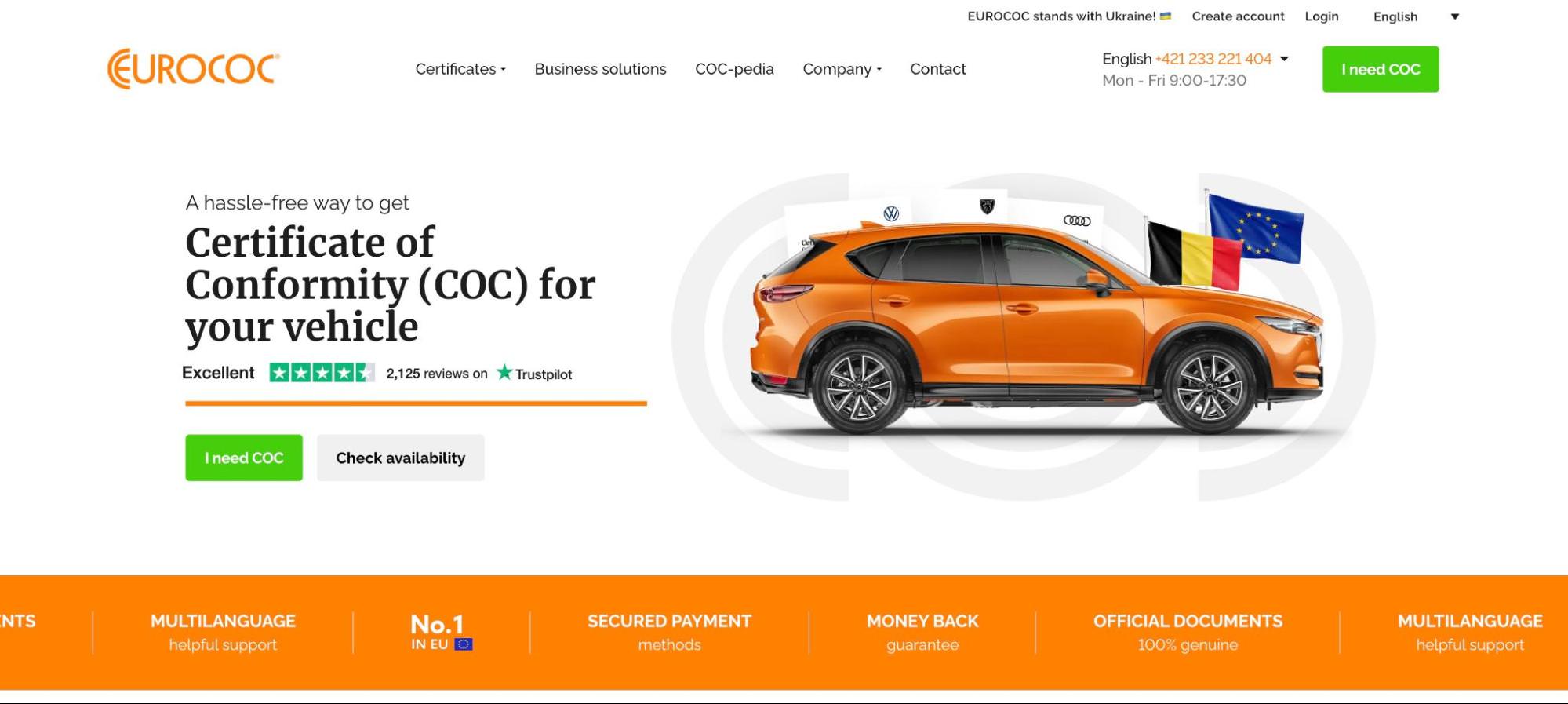
-
Your company identification (CIF)
As an active business in Spain, you'll need to provide your Certificado de Identificación Fiscal number, which identifies your company to tax authorities.
-
NIE Number (Número de Identificación de Extranjero)
If your company is based outside of Spain, you must obtain an NIE number - a tax identification number for foreigners operating in the country.
-
ITV Card (Tarjeta de Inspección Técnica)
Once in Spain, an imported car must pass an ITV roadworthiness inspection to be legally registered. The ITV Card verifies that the vehicle meets safety and environmental standards.
IEDMT registration tax and VAT
As with the majority of vehicles available on eCarsTrade, you will need to declare and pay VAT in your country of destination, in this case, Spain.
Most of our cars are sold with VAT excluded, so the amount you will have to pay in Spain is 21% of the purchase price of the car.
The registration tax rate for used vehicles, known as the IEDMT (Impuesto Especial sobre Determinados Medios de Transporte), is determined by factors such as the market value of the vehicle, its official CO2 emission figures, and the region of residence of the buyer.
Step-by-step process - from purchasing a car to importing it to Spain
1. Purchase your vehicle through eCarsTrade's online auctions
Buying a car is simple with eCarsTrade. Simply participate in our online auctions or choose a vehicle directly from Our Stock.
As soon as we receive your payment, we'll begin the process of transporting your newly acquired car to our parking facility in Belgium.
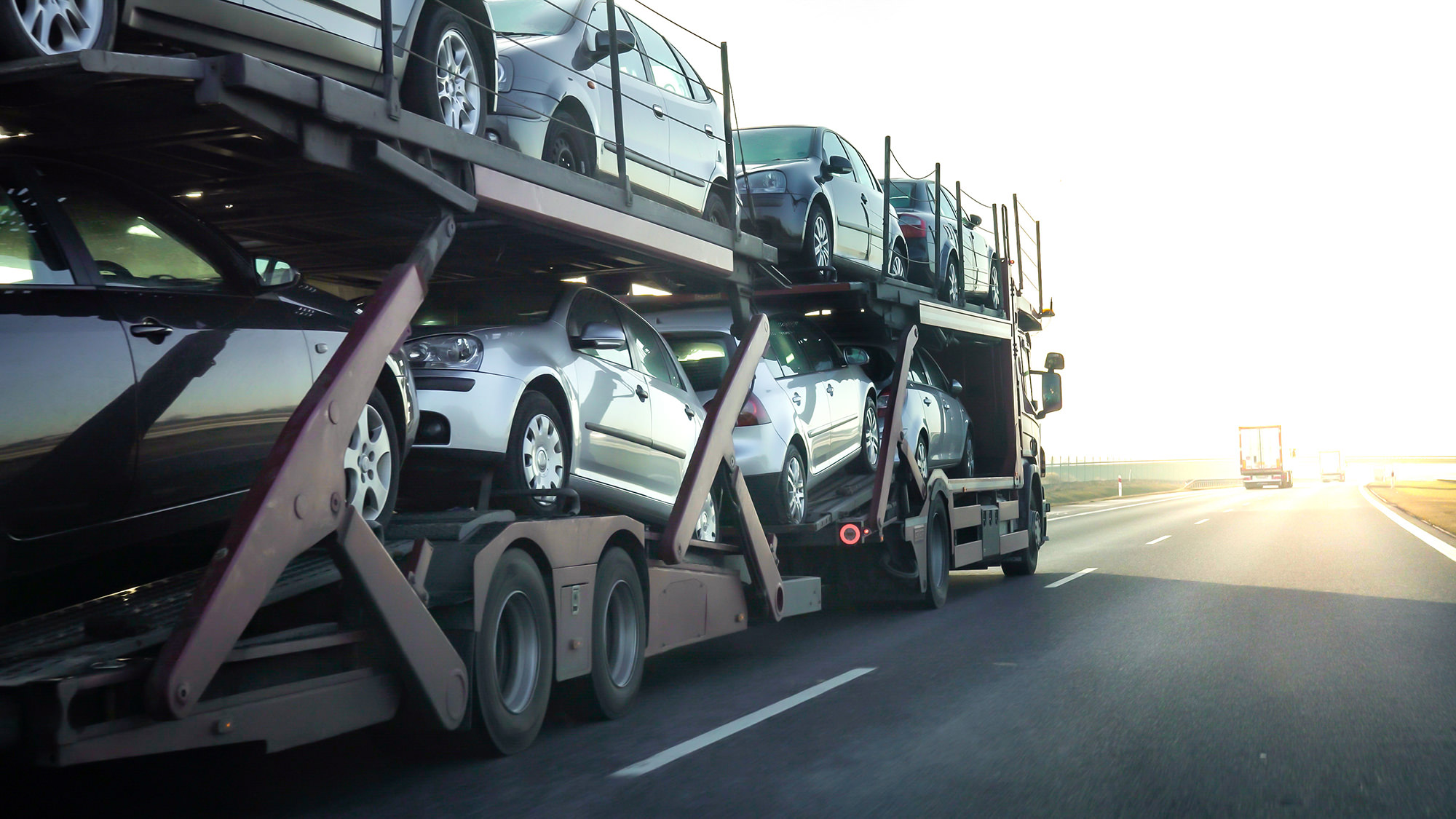
2. Arrange transportation to Spain
Once your car is ready for collection, just let us know if you'd like eCarsTrade to organize the delivery to Spain or if you prefer to pick it up with an official truck transport company. We're here to make the process of transporting vehicles to your dealership as smooth as possible for you.
Once the car is in Spain, you will have 30 days to register it with the authorities.
eCarsTrade offre aste online di veicoli ex-leasing dall'Europa!
Registrati gratuitamente3. Secure a Certificate of Conformity (COC)
If the car you purchased doesn't come with a COC, you'll need to obtain one using the methods we discussed earlier.
You can either request it from the vehicle's manufacturer or order it from a specialized website like EuroCOC.
4. Pass technical inspection - ITV (Inspección Técnica de Vehículos)
When you're bringing a car into Spain, the first thing you will need to do is get it through a technical inspection.
It doesn't matter if your vehicle passed its MOT, TÜV, or any other technical checks in its previous country – those inspections won't be recognized in Spain.
Go to the nearest ITV station and take these documents with you:
- Original registration documents
- Certificate of Conformity (CoC)
- Proof of purchase/invoice
- Your Spanish ID or NIE number
You will receive an ITV Card (Tarjeta de Inspección Técnica).
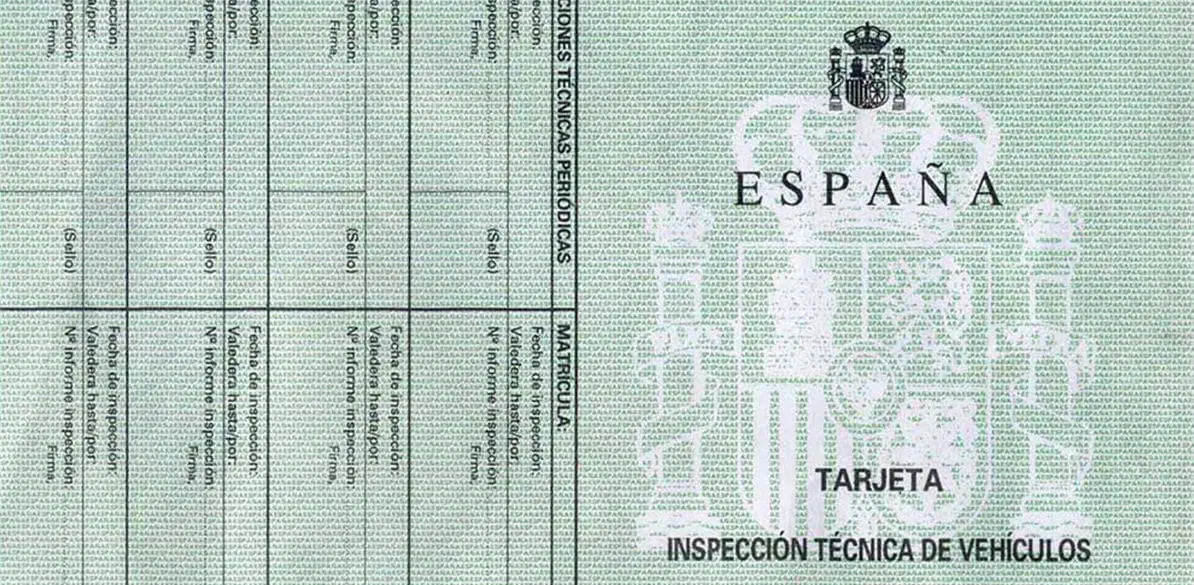
Example of an ITV card
5. Pay VAT
The vast majority of cars on eCarsTrade are sold VAT-exclusive, meaning that you will need to declare and pay the VAT when you import the car to Spain.
You will need to do this in person at your local Dirección General de Tráfico (DGT). You can find your nearest DGT through their official website.
You will receive a receipt of your VAT payment.
6. Register the vehicle & pay the IEDMT registration tax
Now is the time to register your vehicle!
To register a car in Spain, you have two options:
1) through the DGT's online service
2) in person at any DGT vehicle registration office. For this option, you will need to make an appointment ahead of time!
When registering, you'll also have to pay the IEDMT tax, which is calculated using your vehicle's CO2 emissions and current market value.
To pay this tax, fill out form 576 and submit it. You can pay the fee online or at the DGT offices.
You will also need the following documents:
- The official registration application form
- Proof of identity
- Proof of purchase / sales invoice
- ITV card
- Original vehicle documentation from the country of origin
- Receipts showing payment of all applicable taxes
- Proof of the vehicle's tax address
Once the DGT verifies that all your paperwork is correct, they will finalize the registration process. You will get an official registration number and a certificate of registration.
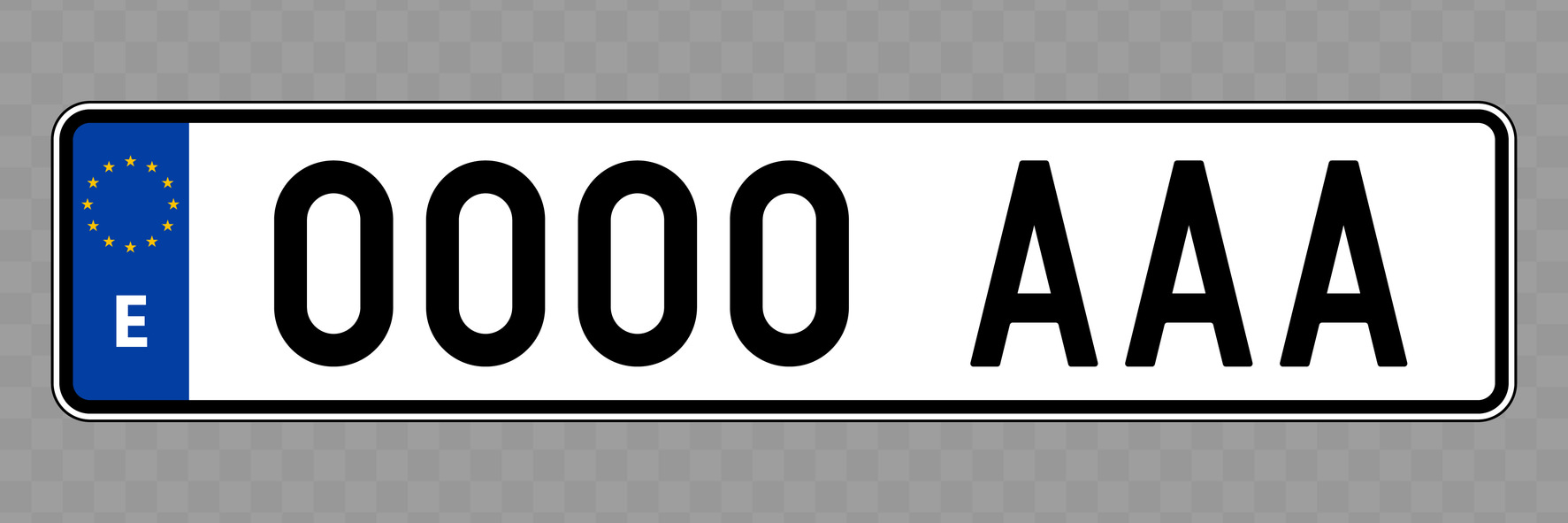
7. Buy new license plates
After finishing the registration process, your next step is to purchase registration plates from an authorized vendor and place them on your vehicle.
You can pay the fee for your new license plates online.
Extra tip - Temporary registration with Placas Verdes (Green plates)
Remember, you have 30 days from the moment your new vehicle arrives in Spain to complete the registration process.
However, if you can’t complete your vehicle registration within the one-month timeframe, don't worry—the DGT offers a temporary registration option.
This allows you to obtain provisional green license plates (Placas Verdes), granting you permission to drive your vehicle for up to two months.
You can apply to get green plates:
1) online through the DGT's online service
2) by visiting a DGT vehicle registration office in person. Again, scheduling an appointment is necessary!
You will need these documents:
- The filled-in official registration application form
- Proof of identity (not required for online registration)
- All documents required for the regular registration process
After successfully obtaining temporary registration, your next step is to visit an authorized retailer to purchase the green license plates and have them properly affixed to your vehicle.

FAQ
Here are answers to some frequently asked questions about bringing vehicles into Spain from other EU countries:
► How does the import process differ for dealerships compared to individual importers?
The overall process is largely the same whether you're a dealership or a private individual. However, dealerships often have established logistics networks and collaborate with agencies specialized for import to handle the details. They may also be able to import multiple vehicles more efficiently.
► How can a business obtain temporary import plates for imported vehicles?
Temporary plates (Placas Verdes) can be issued by the DGT for importing a vehicle into Spain. You'll need to provide proof of purchase, identification, and payment of applicable fees. These allow you to drive the car for two months and then you’ll need to apply for permanent registration.
► Is eCarsTrade providing support with car import within the EU?
While your Account manager is always here to answer any questions and give support, when it comes to import, we always advise collaborating with specialized import agencies who deal with this process on a daily basis.
► Are there any emission considerations for vehicles in Spain?
Spain has strict emission standards aligned with EU regulations. Imported cars must meet these requirements, which impact the registration tax rate. Choosing vehicles with lower emissions can help manage your tax liabilities.

All you need to know about car import to Spain
Importing cars from the EU into Spain for your dealership is a strategic way to expand your inventory and meet local market demands.
While the process involves various steps and requirements, tackling them methodically can lead to a successful importation experience.
With the right preparation and knowledge, you can efficiently bring vehicles into Spain to grow your business.
Discover a diverse range of ex-lease and rental vehicle auctions from top European companies through eCarsTrade! We partner with reputable suppliers like Arval, Athlon, KBC, and ALD to bring you a wide selection of second-hand used cars from lease and rental companies. Find your next gem and bid with confidence in our transparent and secure auction platform.


